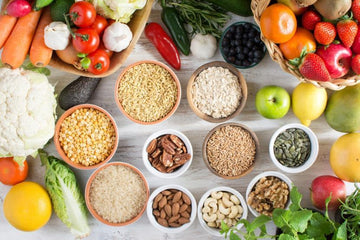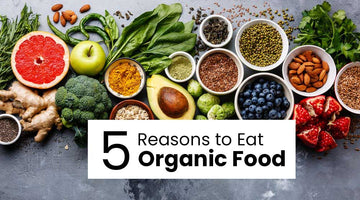
We all know how fibre is useful for our body, let us understand it more briefly.
Benefits of Fibre and Organic Foods
- Digestive Health
- How Fibre Helps: Fibre makes your poop bulkier and softer, which helps you go to the bathroom regularly and prevents constipation.
- How Organic Food Helps: Organic foods are grown without synthetic pesticides and fertilizers, which means they have fewer chemicals that can disrupt your digestive system. They also tend to have higher levels of nutrients and beneficial bacteria, supporting a healthier gut.
- Keeps You Full and Helps with Weight Control
- How Fibre Helps: Fibre-rich foods are filling, so you don’t feel hungry as quickly, helping you eat less and manage your weight. Fibre also slows digestion, keeping blood sugar levels steady.
- How Organic Food Helps: Organic foods often have more nutrients and fewer additives, which can help regulate your appetite and improve the quality of your diet. Eating nutrient-dense organic foods can keep you satisfied longer and support healthy weight management.
- Good for Your Heart
- How Fibre Helps: Some types of Fibre can lower the bad cholesterol in your blood, which is good for your heart. Fibre can also help lower blood pressure.
- How Organic Food Helps: Organic foods have higher levels of antioxidants, which can protect your heart by reducing inflammation and oxidative stress. They also lack harmful chemicals that can negatively impact heart health.
- Controls Blood Sugar
- How Fibre Helps: Fibre slows down how quickly sugar enters your bloodstream, helping keep your blood sugar levels steady and preventing spikes.
- How Organic Food Helps: Organic foods are free from synthetic additives and pesticides that can disrupt metabolic processes. They also tend to have a lower glycemic index, which can help maintain stable blood sugar levels.
- Healthy Gut
- How Fibre Helps: Fibre acts as food for the good bacteria in your gut, helping them grow and keep your digestive system healthy. It also produces helpful compounds that reduce inflammation.
- How Organic Food Helps: Organic foods support gut health by providing more beneficial bacteria and fewer harmful chemicals. They often have higher levels of prebiotics, which feed the good bacteria in your gut.
- May Help Prevent Cancer
- How Fibre Helps: A high-Fibre diet can lower your risk of developing colon cancer by speeding up the removal of waste from your digestive system.
- How Organic Food Helps: Organic foods are free from pesticides and chemicals linked to cancer. They also have higher levels of antioxidants and nutrients that can help protect cells from damage and reduce the risk of cancer.
- Better Skin
- How Fibre Helps: Fibre helps your body get rid of toxins, which can lead to clearer skin. It also reduces inflammation, which can help with acne and other skin issues.
- How Organic Food Helps: Organic foods are less likely to contain pesticides and chemicals that can irritate the skin or cause breakouts. They are also richer in vitamins and antioxidants that support healthy skin.
Types of Fibre:
- Soluble Fibre: Found in foods like oats, beans, apples, and carrots. It dissolves in water and forms a gel-like substance.
- Insoluble Fibre: Found in foods like whole grains, nuts, and the skins of fruits and vegetables. It doesn’t dissolve in water and adds bulk to your stool.
How Much Fibre Do You Need?
- Men: About 30-38 grams per day
- Women: About 21-25 grams per day
Eating a variety of Fibre-rich and organic foods, like fruits, vegetables, whole grains, and beans, can help you get the Fibre you need and keep your body healthy.
Tags:






